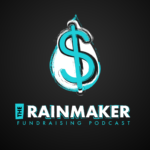
If you’ve spent any time at all in the nonprofit sector, you know there are some subjects that are taboo. Some subjects that are difficult to discuss in public spaces, and others that are purely unpopular.
Our guests today refer to those topics collectively as “Nonprofit F-Words.”
No, not THAT F-Word. I promise.
In this episode, we connect with Ashley King Nittle and Rachel Minnick to discuss these Nonprofit F-Words:
Fair Compensation
- The world has changed after COVID-19. It used to be that nonprofit employees were expected to do the hard work because they were passionate about the cause. The pandemic and the aftermath have changed this. We need to be honest about compensation, expectations, and employee needs if we’re going to succeed together.
- Pay transparency, and honest discussions about what is expected of employees is critical as we move into a new talent reality. Organizations that don’t currently engage in transparent conversation over compensation may face increasing backlash and experience even more difficulty in filling competitive roles without increasing transparency around their compensation.
- Organizations should think creatively about total compensation, not just salary. This includes benefits and flexibility. At this point in the world, unless an employee has to be in the office physically, consider hybrid or remote work as an additional benefit (and one that MANY in the sector desire).
- Boards, CEO’s, and funders have a unique opportunity to bring greater pay equity to the nonprofit sector, and many employees are pushing for senior-level staff and volunteer leaders to engage in this conversation and bring greater parity to compensation practices in the sector.
Funder Relationships
- One of the biggest disconnects between nonprofits and funders comes in the form of funders wanting to fund “new” and “innovative” projects, but those same funders also want detailed reporting, historical data, and established KPI’s for said projects. The biggest challenge is that new/innovative projects often haven’t had the time to mature enough to provide these things. Rachel and Ashley advocate for more of a lean impact model that allows organizations to test and learn alongside funders without risk of losing support.
- Another big challenge is that often funding requests are cumbersome (i.e., a 35-page submission with detailed reporting for the potential of only a $10,000 grant). Sometimes the juice just isn’t worth the squeeze!
- Bringing alignment between nonprofits and funders requires both parties to come to the table focused on connection. Building that relationship and engaging more deeply than simply completing a funding request is essential to moving beyond a transactional relationship to a transformational relationship where both funder and organization can feel fulfilled in the work.
- Nonprofits have the opportunity to lean in more deeply and push back on funders when their requirements and expectations are out of alignment with what the organization can effectively provide.
Fringe Benefits
- There’s a lot of talk these days about funder and donor expectations, particularly around fringe benefits.
- While some benefits are simple and make sense, more direct conversation needs to happen between nonprofit and funder to ensure there’s alignment between both organizations.
- Sometimes the expectations of funders are excessive and, depending on the funding opportunity, it might make more sense for a nonprofit to decline the grant or gift rather than jump through many unnecessary hoops to secure that funding.
- If organizations show up with hat in hand and behave as if they’re poor and needy, then funders and donors will continue to treat them in this way. Instead, we need to start showing up from a position of strength, articulating our value, and showing funders and supporters that we are on equal footing in working to achieve our shared mission.
Fundraising
- Nonprofit leaders need to be bold. Don’t be afraid to ask for what you need.
- One of the most valuable conversations you can have with a donor or funder is to explain how unrestricted dollars flow through your organization and allow you to make quick decisions.
- Be courageous and push back on donors and funders if what they’re asking for seems out of sync with your mission and what you can accomplish effectively.
- Sometimes the best approach to increasing funding opportunities is to identify and pursue community collaborations across organizations. The more you can showcase how you partner well with other community organizations to increase impact for the community, the more likely you’ll be to tap into serious funding for major transformative change in the community.
Rachel Minnick is a self-described “collaboration nerd,” and the director of the Youth & Family Collective. Her nonprofit and local government experience spans over 25 years in organizations in the Bay Area and Sacramento, including the City of Sacramento, Reading Partners, the Peninsula Family YMCA, WEAVE, Child Action, Inc., and the California Charter Schools Association. Her passion is building collaboration and trust among local nonprofits and philanthropy, with the end goal of improving services for those in need. She earned her master’s degree in educational entrepreneurship from University of the Pacific in July 2020.
Ashley King Nittle is the Director of Communications at PRO Youth and Families. The foundation of her work is grounded in the power of human connection. She believes that telling the story of the organization can only occur authentically when people feel connected – when they are truly heard, seen, and valued. Ashley’s approach is heart-centered and that begins with pouring into the team and building internal relationships. Ashley is a graduate of Wright State University (M.A. History) and the University of Toledo (B.A. Communications). She has worked in the nonprofit sector for seventeen years and is a proud alumnus of AmeriCorps National Civilian Community Corps (NCCC).
